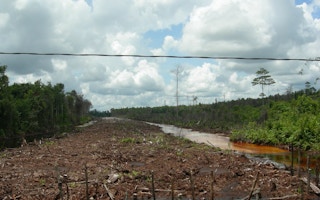President Joko “Jokowi” Widodo is preparing significant steps toward addressing the underlying causes of Indonesia’s devastating wildfires, including an enhanced moratorium on licenses to exploit peatlands, but has yet to make the measures legally binding.
The developments come with Jokowi traveling to Washington DC to meet US President Barack Obama as part of an official visit to the country.
“Indonesia is in a state of emergency with fires burning from Papua to Sumatra,” said Greenpeace’s country director for Indonesia, Longgena Ginting.
Sutopo Purwo Nugroho, spokesman for Indonesia’s disaster management agency, this weekend characterized the disaster as “a crime against humanity of extraordinary proportions.”
He said more than 500,000 people have developed respiratory problems since agricultural fires and peatland hotspots began to burn through Indonesia’s hinterlands in June.
Jokowi held a meeting on Friday morning with environment minister Siti Nurbaya, presidential chief of staff Teten Masduki and representatives from nine NGOs to discuss the government’s long-term and more-immediate plans to manage the emergency.
The NGOs told the president the strongest possible moratorium was required on all peatlands in Indonesia in order for meaningful progress to be made. While firefighting efforts to contain surface fires can have some impact, peatland hotspots can burn several meters underground and can be extinguished only by sustained rain. Rain is not expected for at least another month because of the extended dry season brought on by the El Niño weather phenomenon.
Legally binding peatland ban in the works?
The proposal on the table is for the president to ban any future peat license, and to revoke existing concessions on which development has yet to begin.
The minister in charge of overseeing Indonesia’s humanitarian and firefighting response told the Sunday Times newspaper this weekend that the government would revoke peatland licenses on which development had not yet commenced.
“The government is firm, we will revoke the licenses of peatland concessions held by companies that have not been used or planted,” said Coordinating Minister for Political, Legal and Security Affairs Luhut Pandjaitan.
Indonesia currently has a moratorium on new licenses for primary forest and peatland development only in an informal presidential instruction, known as an inpres, a planning document used to communicate policy to government ministries. It has no legal basis.
Mongabay understands the president is planning a legally binding presidential decree, or perppu, to formally ban future development on Indonesian peatlands and to review existing concessions for possible revocation.
Greenpeace’s Longgena told Mongabay the president’s chief of staff said the perppu would be published “soon.” The NGO country director said he hoped a legally binding perppu would be published within a fortnight. Without a perppu, there is no legal basis for the government to restrict peatland development.
“We’re calling for a total ban [on new peatland developments],” Nirarta Samadhi, Indonesia country director for the World Resources Institute told Mongabay after attending the meeting. He added that he recognizes a review will take time to sort out the legal rights of concessionaires, who might have to be compensated before a permit can be revoked.
While a major step forward, the existence of a perppu is no guarantee the government will be willing or able to enforce such a ban, as Indonesian legislation has proved difficult to translate to the local level amid an extremely decentralized political system, and one rife with corruption.
Mongabay has seen a draft of the presidential instruction, current as of Friday afternoon. While not yet final, the document offers an important insight into the policies the president is readying to combat both the immediate humanitarian emergency and its longer-term underlying causes.
The draft calls for all available resources to be used to manage the fires. Indonesia is also preparing to evacuate residents suffering from the haze, but the government does not have the capacity to evacuate all the millions affected. The document also contains pledges that the government will pursue criminal charges against companies that allow fires to occur in their concessions and prohibit them from conducting an initial public offering in Indonesia.
In addition to banning future licenses and revoking yet-to-be developed concessions, the president is planning on damming canals used to drain water from peatlands, an important start in making the marshy terrain less combustible during the dry season.
Companies use canals to drain peatlands because oil palm trees are unable to grow with saturated roots. Drained peatlands are then far more likely to combust without sufficient water, as has been seen to devastating effect across Sumatra and Kalimantan in recent months.
While the presidential decree is in process, Indonesia is at risk of being criticized for talking a good game while quietly undermining action demanded by its neighbors to fight the underlying causes of annual haze pollution.
Singapore’s foreign ministry said Indonesia had failed to provide full information on companies under investigation despite “repeated requests.” Indonesia agreed to share the information on Sept. 27 but Singapore says it has yet to receive any data or documentation.
“This information will be critical in helping Singapore to take the fullest course of legal action against these companies under the Transboundary Haze Pollution Act,” the ministry said.
Analysts in Indonesia say the government is reluctant to give potentially incriminating evidence to a foreign country and that there are domestic legal impasses preventing it from doing so.
The president is likely to face pressures from sections of the oil palm lobby and some political adversaries who prioritize food security and smallholder welfare ahead of environmental concerns.
Air quality was again in the dangerous zone in many parts of Indonesia on Monday after light haze made it as far as the capital, Jakarta, according to the spokesman of Indonesia’s meteorology agency.
Indonesian media carried more accounts of deaths from the haze over the weekend, while a crowdfunding appeal was attempting to source N95 face masks in children’s sizes because of a severe shortage.










